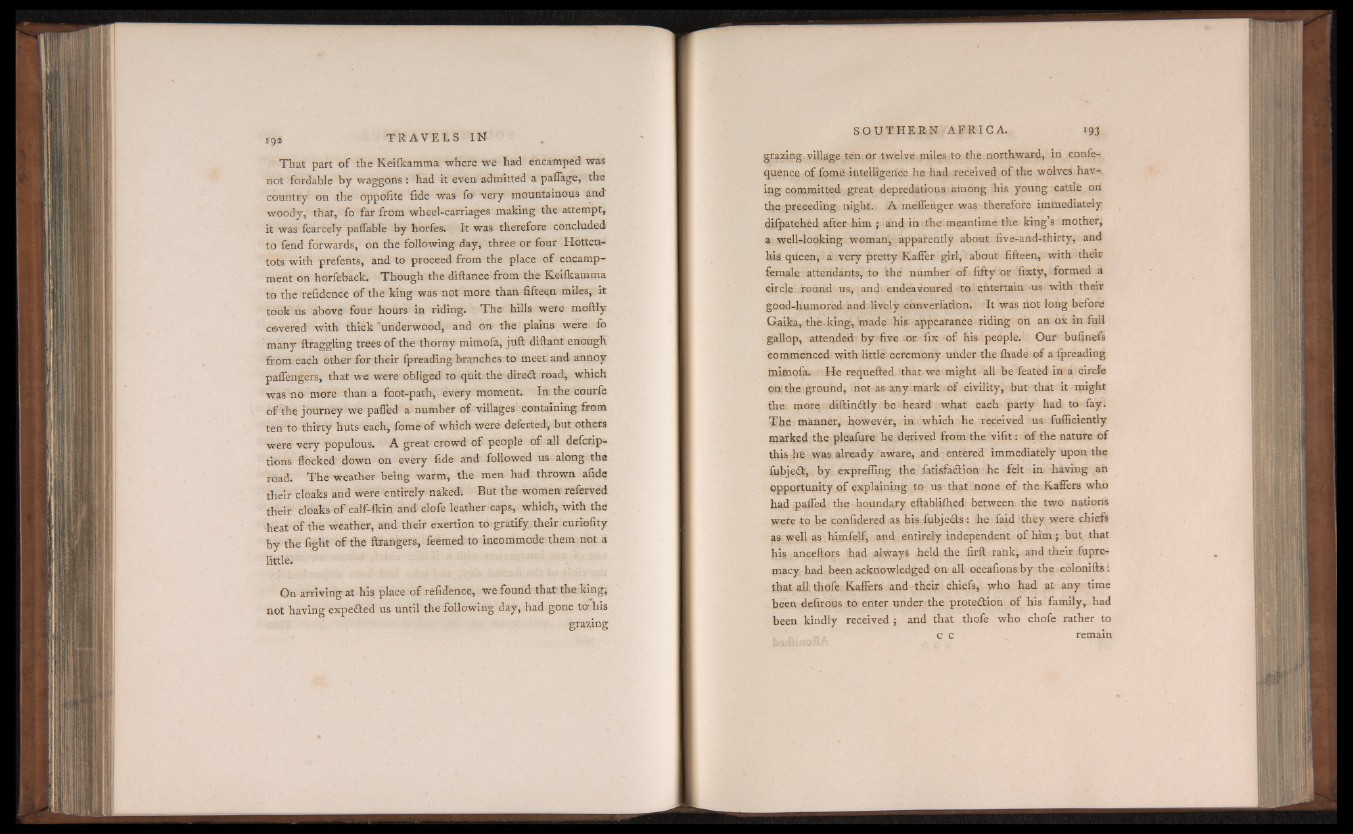
That part of the Keiifcamma where we had encamped was
not fordable by waggons : had it even admitted a paffage, the
country on the oppofite fide was fo- very mountainous and
woody, that, fo far from wheel-carriages making the attempt,
it was fcarcely paflable by horfes. It was therefore concluded
to fend forwards, on the following day, three or four Hottentots
with prefents, and to proceed from the place of encampment
on horfeback. Though the diftance from the Keiikamma
to the refidence of the king was not more than fifteen miles, it
took us above four hours in riding. The hills were moftly
covered with thick "underwood, and on the plains were fo
many draggling trees of the thorny mimofa, juft diftant enough
from each other for their fpreading branches to meet and annoy
paffengers, that we were obliged to quit the diredt road, which
was no more than a foot-path, every moment. In the courfe
of the journey we palled a number of villages containing from
ten to thirty huts each, fome o f which were deferted, but others
were very populous. A great crowd of people o f all defcrip-
tions flocked down on every fide and followed us along the
road. The weather being warm, the men had thrown afide
their cloaks and were entirely naked. But the women referved
their cloaks of ealf-ikin and clofe leather caps, which, with the
■heat of the weather, and their exertion to gratify their curiofity
by the fight of the ftrangers, feemed to incommode them not a
little.
On arriving at his place of refidence, we found that the king;
not having expedited us until the following day, had gone to-his
grazing
grazing village ten or twelve miles to the northward, in confe-
quence of fome intelligence he had received of the wolves having
committed great depredations among his young cattle on
the preceding night. A meffenger was therefore immediately
difpatched after him ; and in the meantime the king’s mother,
a well-looking woman, apparently about five-and-thirty, and
his queen, a very pretty Kaffer- girl, about fifteen, with their
female attendants, to the number of fifty or fixty, formed a
circle round us, and endeavoured to entertain -us with their
good-humored and lively converfation. It was not long before
Gaika, the . king, made his appearance riding on an ox in full
gallop, attended by five or fix of his people. Our bufinefs
commenced with little ceremony under the ihade of a fpreading
mimofa. He requefted that we might all be feated in a. circle
on the ground, not as any mark of civility, but that it might
the more diftinftly be heard what each party had to fay.
The manner, however, in which he received us fufficiently
marked the pleafure he derived from the vifit: of the nature of
this he was already aware, and entered immediately upon the
fijbjeit, by exprefling the fatisfadtion he felt in having an
opportunity o f explaining to us that none of the Kaffers who
had pafled the boundary eftabliftied between the two nations
were to be confidered as his fubjects: he faid they were chiefs
as well as himfelf, and entirely independent of him; but that
his anceftors had always held the firft rank, and their fupre-
macy had been acknowledged on all occafions by the eolonifts:
that all thofe Kaffers and their chiefs, who had at any time
been defirous to enter under the proteftion of his family, had
been kindly received ; and that thofe who chofe rather to
c c _ remain